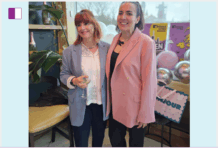Ritah Nakiganda, an entrepreneur and financial trainer, has an inspiring story of overcoming self-doubt and transforming her own mindset to help others. Her journey from internalized feelings of inadequacy to becoming a confident leader in financial literacy serves as a powerful lesson for anyone struggling with self-esteem. Ritah Nakiganda now empowers young women and children with financial literacy, helping them break free from the same limiting beliefs she once faced.
The Early Struggles with Self-Doubt Ritah Nakiganda’s story begins in an environment that encouraged self-confidence, but for reasons she couldn’t initially understand, that confidence never took root. Despite attending schools designed to foster self-esteem in students, Ritah Nakiganda found herself constantly questioning her worth. She remembers feeling like she was never good enough, even when she achieved significant milestones. It’s a feeling many can relate to—the sense that no matter what you accomplish, it’s not quite enough, and you’re always behind some invisible schedule or timeline.
For Ritah Nakiganda, this led to a habit of dismissing her achievements as something anyone could do. Despite receiving positive feedback from those around her, she couldn’t internalize it. Instead, she routinely questioned her abilities, giving herself negative feedback and feeding the cycle of self-doubt.
This self-criticism, as Ritah Nakiganda reflects, may seem harmless at first. But over time, it becomes more than just negative self-talk—it sets the stage for accepting criticism from others. When you constantly speak poorly to yourself, you open the door for others to do the same.
Recognizing the Root Cause of Self-Doubt The turning point in Ritah Nakiganda’s journey came when she recognized that self-doubt is something everyone experiences, even the successful people she admired. It was then she realized that her fear—fear of failure, fear of being seen as lazy or incompetent—was at the core of her self-doubt. This fear had been breeding her feelings of inadequacy for years.
Once she identified her core fear, Ritah Nakiganda began attacking it whenever it threatened to bring her down. She became intentional about dismantling the limiting beliefs she had held for so long, recognizing that even those who appear the most confident grapple with doubt.
Strategies for Overcoming Self-Doubt Ritah Nakiganda shares several strategies that helped her overcome self-doubt, all rooted in a mindset shift that can benefit anyone struggling with feelings of inadequacy. One of the most important strategies is to not compare yourself to others. Self-doubt often drives us to measure our progress against someone else’s, leading to feelings of failure and disappointment. As Ritah Nakiganda emphasizes, comparison is the thief of joy, and focusing on your unique journey is key to overcoming this trap.
Another crucial approach is to reframe negative self-talk. Ritah Nakiganda admits that we tend to be harder on ourselves than we are on anyone else. By replacing negative self-talk with positive affirmations, she was able to shift her internal narrative. Instead of criticizing herself, Ritah Nakiganda focused on continuous improvement, giving herself grace and encouragement along the way.
Ritah Nakiganda also highlights the importance of celebrating successes, no matter how small. In her earlier years, she overlooked her achievements, dismissing them as insignificant. Now, she makes a point of acknowledging every win, recognizing that each step forward, no matter how small, is worth celebrating. This shift in perspective helped her build confidence and combat the feelings of inadequacy that had plagued her for so long.
Focusing on strengths is another strategy Ritah Nakiganda advocates. By emphasizing her positive qualities and skills, she was able to shift her attention from what she lacked to what she already had. This doesn’t mean ignoring areas of improvement, but it means recognizing and appreciating the strengths that can carry you forward.
Setting Achievable Goals and Embracing Growth Another key element in Ritah Nakiganda’s journey was learning to set achievable goals. Instead of overwhelming herself with large tasks, she began breaking them down into manageable steps, focusing on small, daily progress. This approach not only made her goals more attainable but also helped her regain confidence as she steadily checked off each task.
Perhaps one of the most profound lessons Ritah Nakiganda learned was seeing self-doubt as an opportunity for growth. She now views doubt as a mirror, showing her where she can improve and what areas need more attention. Instead of letting doubt paralyze her, Ritah Nakiganda uses it as data to create action items for her personal and professional development.
Empowering Others Through Financial Literacy Today, Ritah Nakiganda is not only an entrepreneur but also a passionate financial trainer. Her mission is to empower young women and children with financial literacy, teaching them to manage saving groups, retirement planning, and everything finance-related. But her lessons go far beyond numbers—Ritah Nakiganda is teaching her students how to develop confidence in their abilities and overcome the same self-doubt that once held her back.
Ritah Nakiganda’s personal journey is woven into the way she teaches financial literacy. She understands that for many of her students, the biggest barrier isn’t a lack of knowledge—it’s the internal limitations they’ve placed on themselves. Her approach is holistic, focusing on building confidence, setting achievable financial goals, and celebrating every step of progress.
A Role Model for Overcoming Limitations Ritah Nakiganda’s journey is a testament to the power of resilience and self-reflection. By facing her fears, challenging her self-doubt, and embracing growth, she has transformed not only her own life but the lives of those she teaches. Ritah Nakiganda’s story reminds us that the greatest relationship we can ever have is with ourselves, and once we learn to overcome our internal limitations, the possibilities are endless.
For anyone struggling with feelings of inadequacy, Ritah Nakiganda’s story offers hope and practical strategies for overcoming those doubts. Her work in financial literacy is not just about managing money—it’s about empowering others to believe in their potential and to take control of their future, one small step at a time.



































